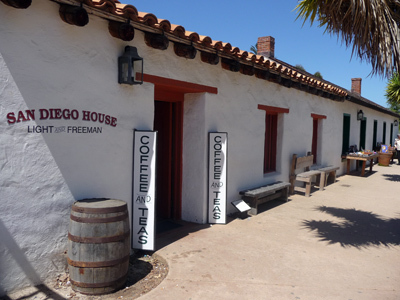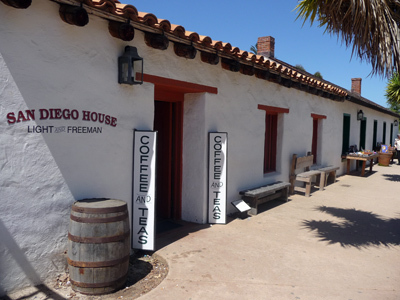
Richard Freeman, deputy city marshal and entrepreneur in the early years of San Diego, California, was born somewhere in the Eastern United States. His date of birth is unknown and so are his parents’ names. In fact, there is little information known about his life before he came to San Diego. Some historians have speculated that he may have been a fugitive slave. We do know that Freeman came to San Diego with Allan B. Light, another early black settler, in 1845, and then were the only two African American settlers to reside in what is now Old Town San Diego. At the time, San Diego was part of Mexican California, but a number of people like Freeman and Light, both of whom were born in the United States, had settled there.
Freeman and Light purchased a building from Henry D. Fitch, a Massachusetts sea captain and trader, for $96 on February 10, 1847. The building had four rooms and would be known as the Freeman-Light House or the San Diego House. Inside, the two would operate a successful saloon, which was remarkable, as, at the time, most African Americans would be engaged in menial labor rather than business. Freeman and Light held the distinction of owning the first saloon in San Diego. The entrepreneurs also purchased a house across the street from what is now the Whaley House in Old Town. It is not known if this was their residence or rental property.
Richard Freeman also served as the settlement’s unofficial postmaster until 1850. In May of 1851, three years after the United States claimed jurisdiction over San Diego and the rest of California, Agoston Haraszthy, a Hungarian count and successful local businessman, won election as city marshal of the newly incorporated city of San Diego. He appointed Richard Freeman to serve as deputy city marshal, which made him the first African American law enforcement officer in California’s history.
Freeman did not serve in this capacity very long. In 1851 he died of unknown causes in San Diego. He had a daughter, Anita, but it is not known if Freeman had married the mother, and her name does not appear in the historical records of the era. Anita, however, inherited the building Freeman and Allen Light had purchased in 1847. She continued to operate the saloon in the building until 1857, when it was demolished so that construction of the American Hotel could commence.

